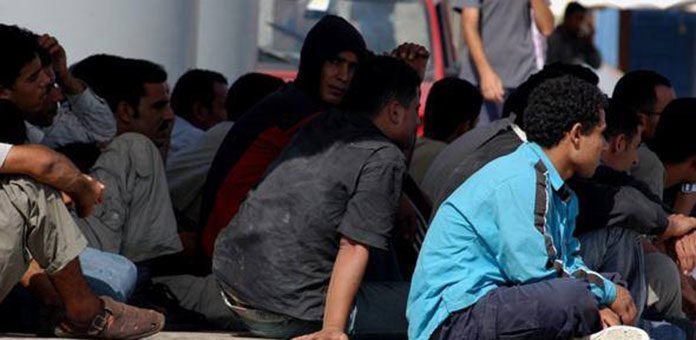Most recent research demonstrates an absence of all-encompassing coordination or the association of any “boss”- style syndicators in the criminal operations unlawfully transporting individuals from the Horn of Africa into Northern Europe by means of Libya.
Rather, transnational pirating courses were observed to be exceptionally fragmented: each stage an aggressive commercial center of “free and self-ruling” runners – and in addition state armies and ruffians – that must be consulted by transients battling for an existence past the Mediterranean Sea.
The main “system investigation” of this blasting criminal endeavor recommends that fruitful runners require a notoriety among vagrants and that expelling any individual bootlegger will just outcome in rivals quickly grabbing their “piece of the pie”.
Dr. Paolo Campana from Cambridge University‘s Institute of Criminology directed the examination utilizing proof from the 18-month examination by Italian prosecutors that took after the Lampedusa wreck, in which 366 individuals lost their lives.
The work included information from wiretapped phone discussions between runners at all stages, declarations gathered from transients, interviews with police team individuals, and foundation data on guilty parties.
Campana said, “The smuggling ring moving migrants from the Horn of Africa to Northern Europe via Libya does not appear to have the thread of any single organization running through it.”
“This is a far cry from how Mafia-like organizations operate, and a major departure from media reports claiming that shadowy kingpins monopolize certain routes.”
Actually, it was the Anti-Mafia unit with the Palermo Prosecutor’s Office at first entrusted with exploring pirating operations on the two sides of the Mediterranean in the wake of the Lampedusa debacle in October 2013.
Campana brings up that they found no confirmation of any contribution from the Sicilian Mafia at the time, even though the installment of assurance cash – in spite of Sicily being a key stage in the sneaking course.
The two arraignments arranged by the Palermo unit – totaling somewhere in the range of 800 pages – framed a noteworthy piece of the dataset Campana went through to code every conceivable datum focuses: references to times, names, occasions, trades, areas et cetera.
Generally speaking, 292 on-screen characters (excluding transients) were distinguished as a major aspect of the Lampedusa carrying ring. 95% were male bootleggers working along the fundamental course, from the Horn of Africa to the Nordic countries in northern Europe – where numerous vagrants wanted to discover shelter – through Libya and Italy.
Be that as it may, the system likewise reached out to Dubai, Israel, Canada, Turkey, Germany and the UK, and incorporated the individuals who capture for emancipate in the deserts of Libya, and Tripoli minutemen who remove fixes to let vagrants from detainment focus.
Campana said, “People specialize. There was a clear separation between those providing smuggling services, those kidnapping for ransom, and those, like the militias, ‘governing’ spaces and supplying protection.”
He also detected signs of rudimentary hierarchy among smugglers in some stages of the route, which roughly divide into ‘organiser’ and ‘aide’.
“Organisers are individuals who give orders but don’t receive them, while aides are highly dependent on organizers for their activities. Organisers make up some 15% of the smuggling network and the remaining 85% occupy a lower ranking aide position.”
The network models built by Campana show that those who operate in the same stage of the journey are almost seven times more likely to have some link with each other. He said, “Even in a network that traverses the hemispheres, it is the local dimension that is still crucial.”
In addition, Campana found that the individuals who share a similar system position as either coordinator or associate are three times more averse to have any tie. “There is little contact between kindred coordinators, fortifying the impression of runners as free-exchanging independents. Business openings destroy coordination,” he said.
In reality, an engaged investigation of a sub-system of 28 bootleggers uncovered that those situated in Italy who tapped straightforwardly into the Libyan ‘commercial center’ had next to no contact with each other.
Wiretaps and tributes recommend that vagrants need to pay isolate merchants for every leg of the trip. The installment was frequently done ahead of time, however, Hawala, a casual cash exchange framework in light of trust.
One wiretap uncovers a charge of $3600 for a couple to cross the Mediterranean. Another wiretapped bootlegger charges €150 per individual for an auto trip from Sicily to Rome.
Campana said, “Reputation is crucial in a competitive market, and the wiretaps show how much value smugglers place on their reputation. Authorities may wish to deliberately tarnish the reputation of smugglers in order to shut down their business.”
One runner was recorded rebuking another for congestion a vessel, contrasting it with the way a grimy washroom thinks about severely everybody who shares the house.
Truth be told, the wiretaps uncover that the death toll in the Lampedusa calamity prompted pay being paid to families by bootleggers terrified of losing future business.
Campana said, “Authorities may wish to deliberately tarnish the reputation of smugglers in order to shut down their business. Criminal justice responses require the adoption of coordinated tactics involving all countries along the route to target these localized clusters of offenders simultaneously.”
“This is a market driven by exponential demand, and it is that demand which should be targeted. Land-based policies such as refugee resettlement schemes are politically difficult, but might ultimately prove more fruitful in stemming the smuggling tide than naval operations.”
